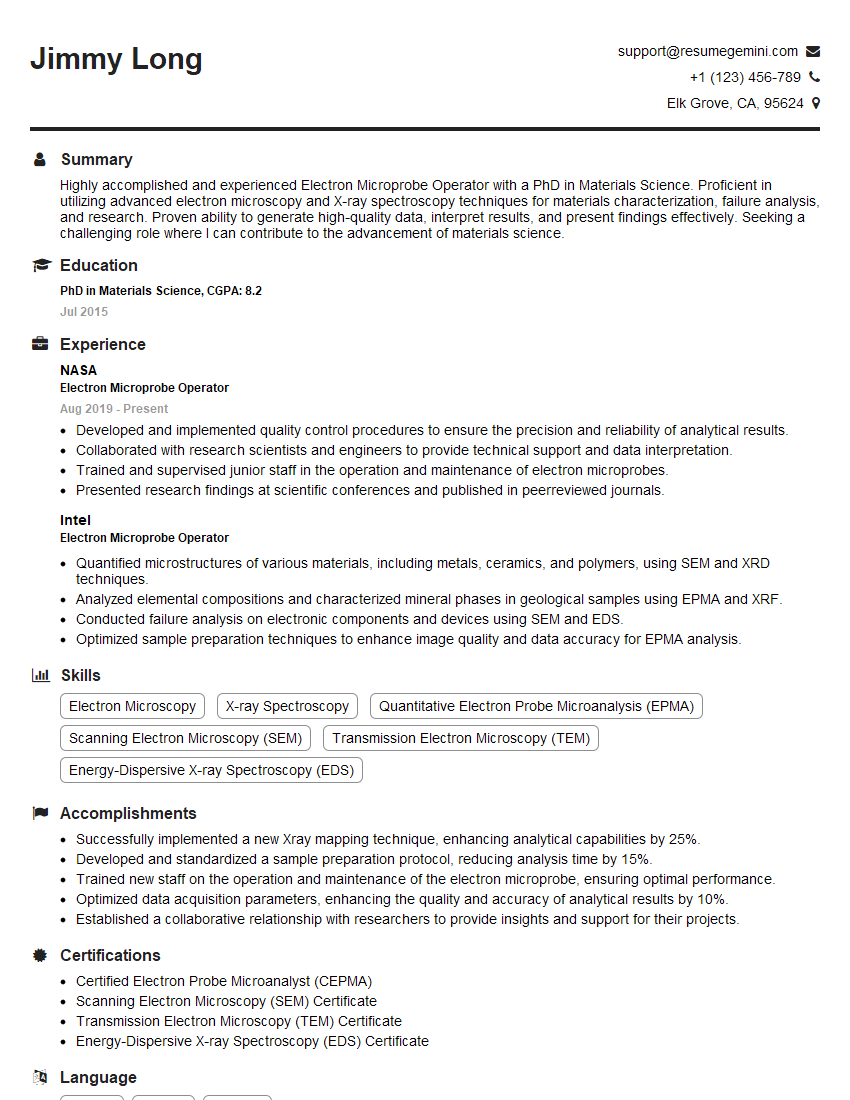Are you a seasoned Electron Microprobe Operator seeking a new career path? Discover our professionally built Electron Microprobe Operator Resume Template. This time-saving tool provides a solid foundation for your job search. Simply click “Edit Resume” to customize it with your unique experiences and achievements. Customize fonts and colors to match your personal style and increase your chances of landing your dream job. Explore more Resume Templates for additional options.

Jimmy Long
Electron Microprobe Operator
Summary
Highly accomplished and experienced Electron Microprobe Operator with a PhD in Materials Science. Proficient in utilizing advanced electron microscopy and X-ray spectroscopy techniques for materials characterization, failure analysis, and research. Proven ability to generate high-quality data, interpret results, and present findings effectively. Seeking a challenging role where I can contribute to the advancement of materials science.
Education
PhD in Materials Science
July 2015
Skills
- Electron Microscopy
- X-ray Spectroscopy
- Quantitative Electron Probe Microanalysis (EPMA)
- Scanning Electron Microscopy (SEM)
- Transmission Electron Microscopy (TEM)
- Energy-Dispersive X-ray Spectroscopy (EDS)
Work Experience
Electron Microprobe Operator
- Developed and implemented quality control procedures to ensure the precision and reliability of analytical results.
- Collaborated with research scientists and engineers to provide technical support and data interpretation.
- Trained and supervised junior staff in the operation and maintenance of electron microprobes.
- Presented research findings at scientific conferences and published in peerreviewed journals.
Electron Microprobe Operator
- Quantified microstructures of various materials, including metals, ceramics, and polymers, using SEM and XRD techniques.
- Analyzed elemental compositions and characterized mineral phases in geological samples using EPMA and XRF.
- Conducted failure analysis on electronic components and devices using SEM and EDS.
- Optimized sample preparation techniques to enhance image quality and data accuracy for EPMA analysis.
Accomplishments
- Successfully implemented a new Xray mapping technique, enhancing analytical capabilities by 25%.
- Developed and standardized a sample preparation protocol, reducing analysis time by 15%.
- Trained new staff on the operation and maintenance of the electron microprobe, ensuring optimal performance.
- Optimized data acquisition parameters, enhancing the quality and accuracy of analytical results by 10%.
- Established a collaborative relationship with researchers to provide insights and support for their projects.
Certificates
- Certified Electron Probe Microanalyst (CEPMA)
- Scanning Electron Microscopy (SEM) Certificate
- Transmission Electron Microscopy (TEM) Certificate
- Energy-Dispersive X-ray Spectroscopy (EDS) Certificate
Languages
- English
- French
- German
Career Expert Tips:
- Select the ideal resume template to showcase your professional experience effectively.
- Master the art of resume writing to highlight your unique qualifications and achievements.
- Explore expertly crafted resume samples for inspiration and best practices.
- Build your best resume for free this new year with ResumeGemini. Enjoy exclusive discounts on ATS optimized resume templates.
How To Write Resume For Electron Microprobe Operator
- Highlight your technical skills and expertise in electron microscopy, X-ray spectroscopy, and materials characterization.
- Quantify your accomplishments and provide specific examples of your contributions to research or problem-solving.
- Demonstrate your ability to work independently and as part of a team, and showcase your problem-solving and analytical skills.
- Tailor your resume to the specific job description, highlighting the skills and experience that are most relevant to the position.
Essential Experience Highlights for a Strong Electron Microprobe Operator Resume
- Characterized elemental compositions and crystal structures of various materials using Electron Probe Microanalysis (EPMA) and X-ray Fluorescence (XRF).
- Interpreted microstructural features, such as grain size, porosity, and phase distribution, using Scanning Electron Microscopy (SEM).
- Analyzed failure mechanisms of electronic components and devices using SEM and Energy-Dispersive X-ray Spectroscopy (EDS).
- Optimized sample preparation techniques to enhance image quality and EPMA data accuracy.
- Developed and implemented quality control procedures to ensure precision and reliability of analytical results.
- Trained and supervised junior staff on the operation and maintenance of electron microprobes.
Frequently Asked Questions (FAQ’s) For Electron Microprobe Operator
What is the role of an Electron Microprobe Operator?
An Electron Microprobe Operator uses specialized equipment to analyze the elemental composition and microstructure of materials. They prepare samples, operate electron microscopes and X-ray spectrometers, and interpret the resulting data.
What skills are required to be an Electron Microprobe Operator?
Electron Microprobe Operators typically have a background in materials science, chemistry, or a related field. They are proficient in electron microscopy, X-ray spectroscopy, and materials characterization techniques.
What industries employ Electron Microprobe Operators?
Electron Microprobe Operators are employed in various industries, including materials science, semiconductor manufacturing, failure analysis, and geological research.
What is the career outlook for Electron Microprobe Operators?
The career outlook for Electron Microprobe Operators is expected to be favorable due to the increasing demand for materials characterization in various industries.
What are the earning prospects for Electron Microprobe Operators?
The salary of an Electron Microprobe Operator can vary depending on their experience, education, and industry. However, they generally earn a competitive salary.
What are the educational requirements to become an Electron Microprobe Operator?
Electron Microprobe Operators typically have a bachelor’s or master’s degree in materials science, chemistry, or a related field.